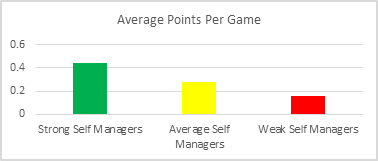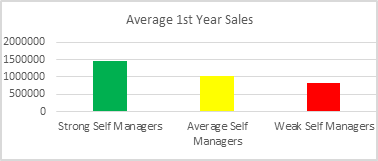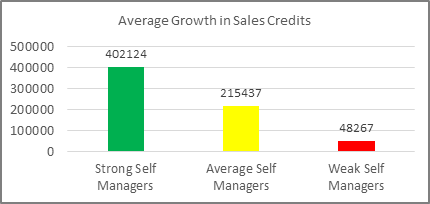For 41 years, Self Management Group has been evaluating and quantifying the personality and attitudinal constructs that best differentiate top performers. With well over 5,000 predictive validation studies completed over this time period, spanning all industries, positions and continents, the most statistically consistent and powerful predictor of top performers is SELF MANAGEMENT.
This consistent finding is even more impressive when you think of the lack of statistical control associated with field research. Our validation studies were undertaken across the globe and over a 4 decade time span (i.e., significant periods of change), in different languages and cultures, with participants of various ages, work experience, and positions; yet despite all of this uncontrolled error, people with a stronger Self Management orientation were statistically over represented among top performers.
Below are just a couple of graphs highlighting the predictive power of Self Management:
Figure 1. NHL Players Over 15 Year Time Span

Figure 2. Financial Services Over 8 Year Time Span

There are a number of reasons for this consistent finding, but by far the most critical is the internal-orientation associated with this personality trait. Self Managers set their own personal goals, and subsequently push themselves towards those objectives. As a result, self managers are less reliant on the typical externally imposed objectives / structure that direct managers typically provide, and are therefore able to function effectively in any type or quality of work environment. This is to say that self managers will thrive and flourish in strong and well established work cultures, but will also find a way to excel and outperform in less than optimal conditions because they are not reliant or affected by these external factors the same way as weaker self managers. This becomes especially apparent during periods of change, uncertainty, and disruption. The performance trajectories between strong, average and weak self managers further separate during these periods of difficulty. This of course is a timely conversation given the abrupt and drastic workplace changes we are all experiencing in the wake of the COVID-19 pandemic. Below you will see validation findings from another major period of disruption. The table below looks at the portfolio growth of financial advisors of varying Self Management levels before and after the 2008 global financial crisis
Figure 3. Average Increase in Sales Credits from Sept 2008 through June 2009

As can be seen from this figure, financial advisors who possessed a strong Self Management disposition further differentiated themselves from their less self-managed colleagues during one of the most difficult financial periods since the Great Depression. This reflects that self managers focus on things that are in their direct control, while attributing both their successes and failures to controllable factors (e.g., effort, attitude, skill). Doing so negates the influence of changing environmental circumstances, as these external factors were never perceived to be influential to the self manager’s success in the first place. Individuals who possess a more external orientation, heavily emphasize and rely on the external factors they perceive as critical to their success (e.g., investor confidence, market performance), and as such are extremely negatively impacted when these factors are removed.
Overall, Self Management orientation is the single most predictive attribute associated with top performers, and is even more apparent and predictive during periods of disruption and difficulty. Given the significant changes to the nature of work that are likely to result from this global pandemic, Self Management will be even more critical moving forward. Consequently, organizations would be remiss if they did not prioritize this construct in their recruitment and selection processes, and ensure that they had a valid and robust method of evaluating this critical attribute.

